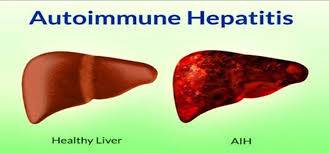Autoimmune hepatitis is a chronic liver disease where the immune system mistakenly attacks healthy liver cells. Here are 20 factors related to autoimmune hepatitis, along with signs and symptoms, effects, and solutions:
**Causes:**
1. Autoimmune disorder.
2. Genetic predisposition.
3. Environmental factors.
4. Family history of autoimmune diseases.
5. Viral infections (possible trigger).
6. Medications (some may be associated).
7. Chemical exposure.
8. Bacterial infections.
9. Hormonal factors (more common in women).
10. Toxins and pollutants.
11. Stress and emotional factors.
12. Immunological factors.
13. Microbial factors.
14. Inflammatory processes.
15. Hormonal contraceptives.
16. Genetic factors.
17. Hormonal changes during pregnancy.
18. Hormonal changes during menopause.
19. Ethnic and geographic factors.
20. Smoking tobacco.
**Signs and Symptoms:**
1. Fatigue.
2. Jaundice (yellowing of the skin and eyes).
3. Abdominal pain and discomfort.
4. Unexplained weight loss.
5. Enlargement of the liver.
6. Elevated levels of liver enzymes.
7. Elevated immunoglobulins (antibodies).
8. Hyperlipidemia (elevated blood lipids).
9. Enlarged spleen (splenomegaly).
10. Ascites (fluid buildup in the abdomen).
11. Pruritus (itchy skin).
12. Dark urine.
13. Pale-colored stools.
14. Anemia.
15. Arthralgia (joint pain).
16. Rashes.
17. Nausea and vomiting.
18. Loss of appetite.
19. Cognitive changes.
20. Coagulation problems.
**Effects:**
1. Chronic inflammation and liver damage.
2. Cirrhosis in advanced cases.
3. Impairment of liver function.
4. Increased risk of liver cancer.
5. Metabolic complications.
6. Bone and joint problems.
7. Impaired bone health.
8. Impaired cognitive function.
9. Impaired quality of life.
10. Increased healthcare costs.
11. Reduced life expectancy.
12. Risk of complications during surgery.
13. Gastrointestinal issues.
14. Hematological abnormalities.
15. Psychological and mood disorders.
16. Cardiovascular issues.
17. Increased susceptibility to infections.
18. Renal problems.
19. Hepatic encephalopathy.
20. Pancreatic dysfunction.
**Solutions:**
1. Early diagnosis and medical evaluation.
2. Immunosuppressive medications to manage inflammation.
3. Lifestyle changes, including a healthy diet and exercise.
4. Management of bone health (calcium and vitamin D supplements).
5. Support from healthcare professionals.
6. Psychological support and counseling.
7. Support from family and friends.
8. Support groups for autoimmune hepatitis patients.
9. Regular medical monitoring.
10. Vaccinations to prevent infections.
11. Managing cardiovascular risk factors (e.g., cholesterol levels).
12. Monitoring for cancer and managing cancer risk.
13. Educational programs for healthcare professionals.
14. Public health initiatives to promote awareness.
15. Legal regulations and policies to reduce toxin exposure.
16. Avoiding alcohol and certain medications.
17. Smoking cessation.
18. Stress management techniques.
19. Hepatitis A and B vaccinations.
20. Liver transplant evaluation for advanced cases.
Autoimmune hepatitis management typically involves ongoing medical care and treatment, as well as addressing complications. If you suspect you have autoimmune hepatitis or are at risk, consult a healthcare professional for evaluation and guidance.



No comments yet
Be the first to share your thoughts!